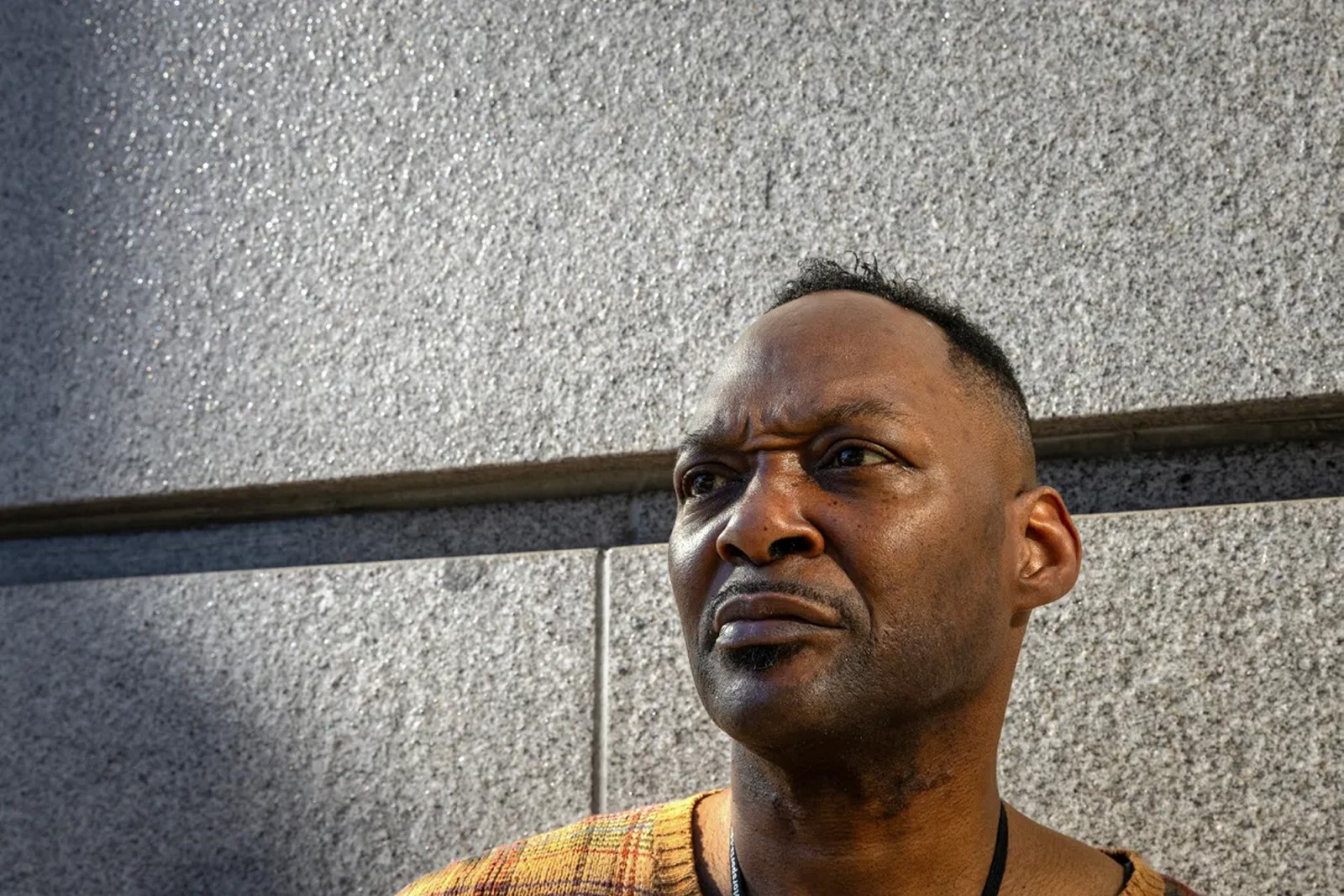

After years of living on the streets and in single-room-occupancy hotels, the cozy studio apartment in San Francisco’s Japantown felt like a sanctuary to Corey Lafayette.
As he cared for the plants on his sunny patio and walked through the building’s tree-lined courtyard, he could feel stress peeling away. No more stops by police. No more strict hotel rules. At the apartment, he was free.
But three years later, he had received an eviction notice. A building manager had raised concerns about the behavior of Lafayette’s guests. The notice said Lafayette had a right to legal counsel and gave a phone number.
Lafayette was lucky: San Francisco is the only city in California that guarantees tenants access to an attorney in eviction proceedings. The city is one of 17 nationwide, plus four states, that have launched right to counsel programs since New York City pioneered the idea in 2017.
Nationwide, fewer than 5% of tenants in eviction cases are represented by an attorney, compared to more than 80% of landlords, the National Coalition for a Civil Right to Counsel estimates.
As evictions soar across California now that COVID-19-era moratoria have expired, tenant advocates are pushing for more cities and counties to follow San Francisco’s example. Having a lawyer, tenant advocates say, can make the difference between a tenant keeping their home — or having the time and money to find a new one — and being put out on the street.
Access to this legal help varies widely depending on where you live, even among cities just a few miles apart.
Floods, then an eviction notice
In Oakley, Nancy Wiles also was facing eviction. She had lived in The Oaks Apartments, a sprawling low-income housing complex, since 2014.
Her building suffered a series of floods, starting with a pipe bursting just outside her ground-floor apartment. Ankle-deep water filled the hallway with tenants trying to block their doorways with trash bags. Another time, she said, water from a leak cascaded down the stairs like a river.
Apartment managers relocated Wiles to a hotel while they fixed the leaks, but she said the problem never seemed fully repaired. Mold sprouted on her bathroom ceiling, said Wiles, who suffers from asthma.
The costs also added up, she said. While she paid her normal rent during weekslong hotel stays, she had to buy takeout food. When apartment management failed to make minor repairs, like fixing a sink that wouldn’t drain, Wiles would pay a family member to take care of it. Working less due to the pandemic and a disability, Wiles started falling behind on rent.
By September, Wiles had had enough. She and her 23-year-old son were packing to move when Wiles was served with eviction papers.
But since she was moving out, the paperwork could wait, she figured. She stuffed it in her purse — a decision that would cost her later.
Evictions can happen fast and are often confusing for tenants. After receiving a notice that their landlord has filed an eviction case against them, tenants have five days to respond in writing or they may automatically lose their case. Once a response is filed, a landlord can request a hearing.
In Contra Costa County where Wiles lives, the vast majority of tenants are unrepresented and face numerous barriers in navigating eviction court, a 2022 report by the East Bay Alliance for a Sustainable Economy said.
Tenants often don’t realize they need to respond to an eviction notice and lose their cases by default.
When tenants do make it to court hearings, they often don’t realize that the case will be decided then. They don’t bring evidence that could help them, such as proof that they paid rent, or that the landlord refused to accept funds.
Eviction “is particularly difficult to navigate — whether you are a tenant or a landlord — without an attorney,” said Alex Werth, a policy consultant who wrote the report.
Back in San Francisco, the city’s taxpayer-supported Eviction Defense Collaborative matched Corey Lafayette with Jacqueline Patton, a tenant attorney.
Lafayette had fallen behind on rent during the pandemic. But when he tried to cover the debt, he said, the apartment manager wouldn’t accept his money.
Lafayette, who is Black and gay, said he thought discrimination was at play. He recalled a conversation he’d had with the apartment manager earlier.
“He told me this is a family-orientated facility and I don’t fit in here and he’s going to get me kicked out however he can.,” he recalled.
The manager denied making that statement when questioned by a reporter.
Lafayette’s eviction notice contained a laundry list of complaints, from keeping the apartment in an “unsanitary condition,” to allowing guests to visit at night, to causing a fire hazard by “putting aluminum foil under the burners of your stove.” Patton and a social worker, Brandon Williams, looked around at Lafayette’s neatly arranged sneaker collection and sparkly red dinette chairs. They had seen hoarder apartments; this wasn’t one.
Video evidence from Lafayette’s landlord showed people loitering near the apartment building, Patton said, but no proof any of them were his guests. Lafayette admitted that one of his guests had taken packages belonging to another tenant, an incident mentioned in the complaint, but said he was “devastated” when he found out and told the person to return them.
Eviction disproportionately affects Black people. Princeton University’s Eviction Lab found fewer than one in five renters nationwide are Black, but more than half of eviction filings are against Black renters.
An unwelcome surprise
Weeks after getting her eviction notice in Oakley, Nancy Wiles still wasn’t sure what to do. She showed it to a friend who is a tenant advocate on the board of the nonprofit Monument Impact. They went to the Pittsburg courthouse to investigate.
At the courthouse, Wiles got discouraging news: Because she hadn’t responded to the notice, the court filed a judgment against her. She owed nearly $7,000 to her former landlord, the court said. The eviction also could go on her credit history, reducing her chances of landing an apartment in the future.
Wiles, who survives mostly on $1,000 a month in disability benefits, was crestfallen. “I can’t afford anything like that,” she said.
While she admitted she had fallen behind on rent, sometimes making partial payments, she pointed to receipts showing she had paid more than The Oaks was alleging. The Oaks’ property management team and lawyers for the property owners did not respond to messages seeking comment.
Wiles thought she should be compensated for the cost and stress of living in a poorly maintained apartment, but not understanding how eviction proceedings worked, she had never appeared in court to make those arguments.
Officials in some California cities and counties are hoping to set up right to counsel programs similar to San Francisco’s.
The right to counsel is “having a moment” partly because “the pandemic shone a light on tenant housing precarity and the widespread nature of evictions,” Werth said.
Landlord groups have opposed some right-to-counsel campaigns.
“Providing a taxpayer-funded attorney to a tenant who did not pay their rent does not stop the eviction,” said Joshua Howard, an executive vice president of the California Apartment Association. “Those funds would be better used to provide rental assistance to prevent the eviction process from ever starting.”
In November, Lafayette walked into the courthouse, his hands trembling.
“I just want this to be over,” he said.
Patton and the lawyer for Lafayette’s landlord told the judge they were close to reaching a deal. He sent them into a hallway to negotiate.
Patton had drafted an agreement in which Lafayette would pay $2,700 in overdue rent with help from a city program and ensure his guests do not disturb other tenants. For him to be in violation, the landlord would have to prove that any “guests” were actually there to visit Lafayette. Lafayette would get two things he had been requesting: a parking space and for his name to be on the apartment’s call box.
Nancy Wiles’ story also had a happy ending: At a legal clinic at Pittsburg Superior Court, she met Gough, the Centro Legal de la Raza attorney. Gough wrote a letter to Wiles’ landlord, who agreed to dismiss the eviction case.
William Goodwin, the friend who helped her, said, “It burns me a little, because Nancy was fortunate, but how many others are out there being victimized?”


 PREVIOUS ARTICLE
PREVIOUS ARTICLE
